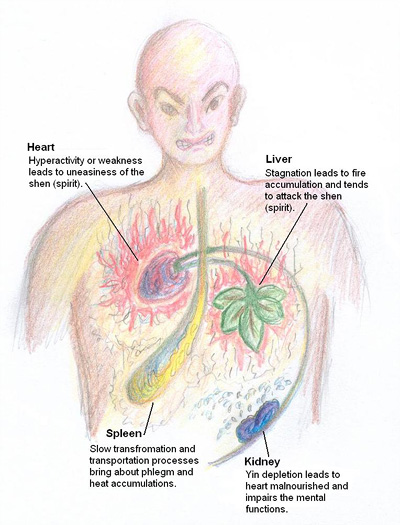Everyone has their own unique sleeping habits, and sleep needs vary greatly from person to person. Insomnia refers to inability to fall asleep or stay asleep for an adequate amount of time. People with insomnia usually have one or more following features:
- difficulty falling asleep;
- shallow sleep or waking up frequently during the night;
- dream-disturbed sleep;
- waking up too early and difficult returning to sleep;
- not feeling well-rested after waking up;
- inability to sleep at all during the night.
Sleeping problems can occur even though there are sufficient time and right environment to sleep. Insomnia lasts for a short time (less than 3 months) is called short-term insomnia, while lasts 3 months or longer is called long-term insomnia.
There are many discussions about sleep and its problems in Traditional Chinese Medicine (TCM). As early as the
Han Dynasty (AD 206 ~ 220 BC), in
The Plain Questions stated: "disharmony of the stomach leads to sleeping problems," meaning improper eating habits usually lead to poor sleep;
Zhang Zhongjing claimed that insomnia is a kind of weakness caused by overwork or overthink. In
The Complete Work of Zhang Jingyue (1640 BC), insomnia was categorized according to two types of development, the present and absent of
evils; that although insomnia are associated with many conditions, it is all about a restless
spirit, either due to evil irritation or under-nourished by nutritive qi. Insomnia resulted from evil irritation usually presents an
excess disharmony pattern, while those due to under-nourishment usually present a
deficient disharmony pattern.
Modern TCM holds that insomnia has many possible causes, including mental distress, poor lifestyle habits, physical problems and medications. Sleep occurs in a yin dominance and is ruled by spirit. When the above factors disturb internal harmony of the body, stability of spirit in the heart is affected and insomnia will then occur.
Among the correlations between the organs and mental functions; the heart is the most important as it houses the spirit; the kidney governs the storage of jing and working with the heard to keep efficient mental functioning; the spleen acts as the nourishing source of mental activity; the liver governs the flow and discharge actions that regulates mental activity directly; and the gallbladder governs some important aspects of mental functioning such as decision making. Insomnia may result when these organs are in disharmony.
Generally, the followings contribute to the development of insomnia:
1. Emotional distress
Emotional distress such as anxiety and anger impair the normal functions of the liver, resulting in liver-qi stagnation. The stagnated qi can easily transform into fire evils and disturb the spirit. Emotional extremes also directly induce the heart to generate
fire evils or make the spirit irritating. When the spirit becomes restless, insomnia will result. In some cases, fear or other emotional stress gradually makes the heart and gallbladder weakened, leading to the spirit detached from the heart and poor sleep. Overthinking and mentally exhaustion damage the heart and spleen, and also consume excessive fundamental substances, resulting in an inadequate nutrient supply for the spirit, and thus develops insomnia.
2. Improper diet
Heavy and spicy foods, dried and fried or greasy foods need extra workload by the spleen and stomach for digestion, known as the transformation and transportation processes in TCM. Overeating and irregular meals easily damage the organs and lead to food retention. These factors will bring about
phlegm and heat accumulations which then travel upwards to affect the head region and induce insomnia.
3. Physical weakness
Constitutional weakness, aging or major illness will bring about a condition known kidney yin deficiency, which can contribute to
disruption between heart and kidney, pathological conditions will occur. The depleted kidney-yin will not be able to nourish the heart, leading to hyperactivity of the heart and mental impairment. In addition, major blood loss or inadequate blood production will lead to heart weakness, which leads to uneasiness of the spirit. In some cases, when a weak and timid person is shocked by a sudden event, their heart-qi will be greatly disturbed, resulting in dysfunction of the spirit and thus occur sleeping difficulties.
4. Imbalance between work and rest
TCM believes that overwork consumes excessive fundamental substances, while too much leisure in life causes dysfunction of the spleen, which leads to poor
transformation and transportation processes. In either situation, there will be inadequate
nutrient essence to produce blood and other fundamental substances, cannot maintain a stable spirit, so sleep problems are likely to occur.

Traditional Chinese medicine views on the development of insomnia
To sum up, sleep is controlled by the spirit in the heart, while the sleep-wake cycle relies on normal functioning of the protective qi, nutritive qi and yin yang balance. Insomnia can be induced by many factors, that interrupt the
natural rhythm or energy circle of the body, and affect the spirit functioning. The main lesion is in the heart, and may also accompany spleen, kidney, liver, gallbladder and stomach disharmonies. Clinically, physicians classify insomnia into two major types:
- Deficient type: the spirit is undernourished, such as having insufficient blood or qi.
- Excess type: the spirit is irritated by pathogens, such as phlegm, fire and dampness as well as blood stasis.



